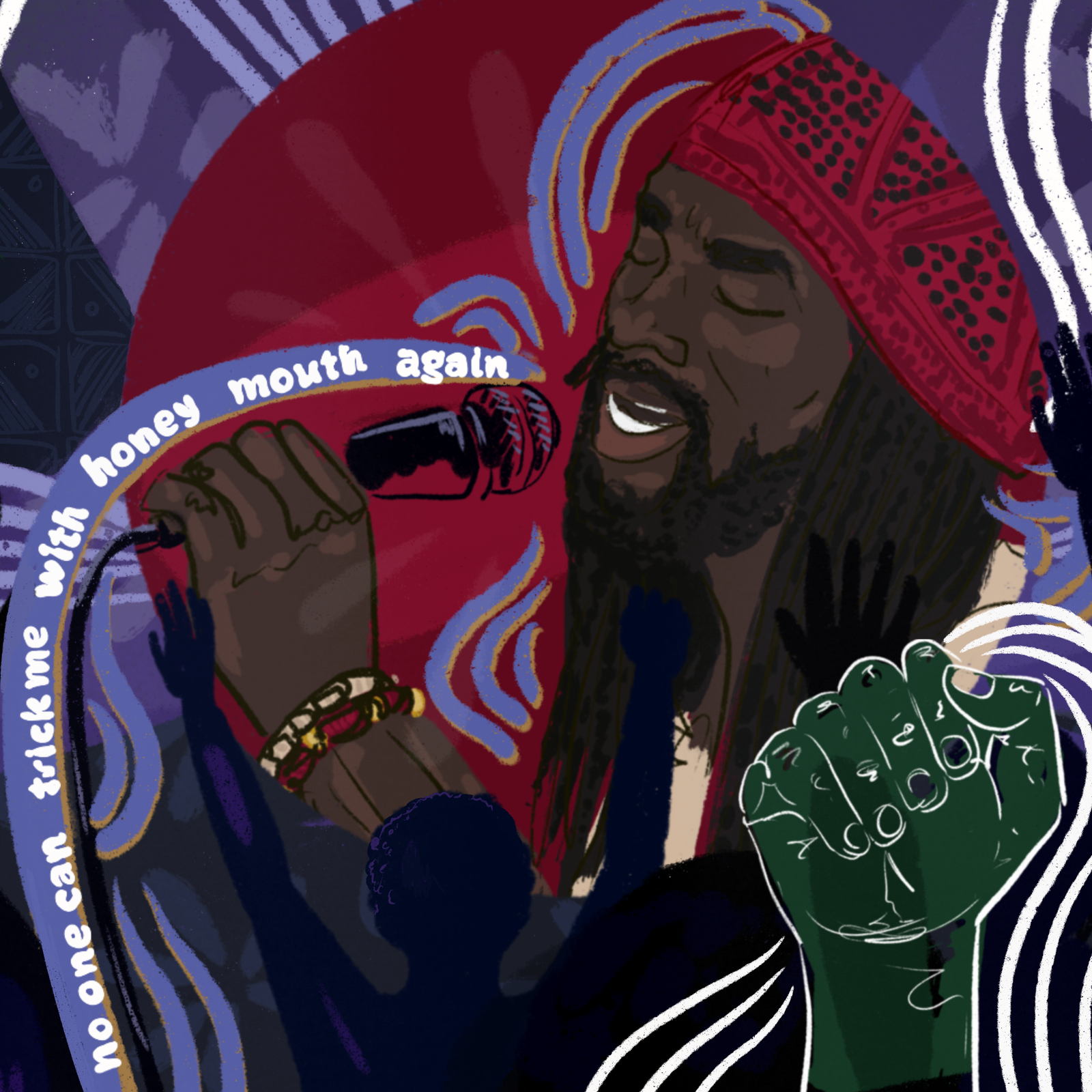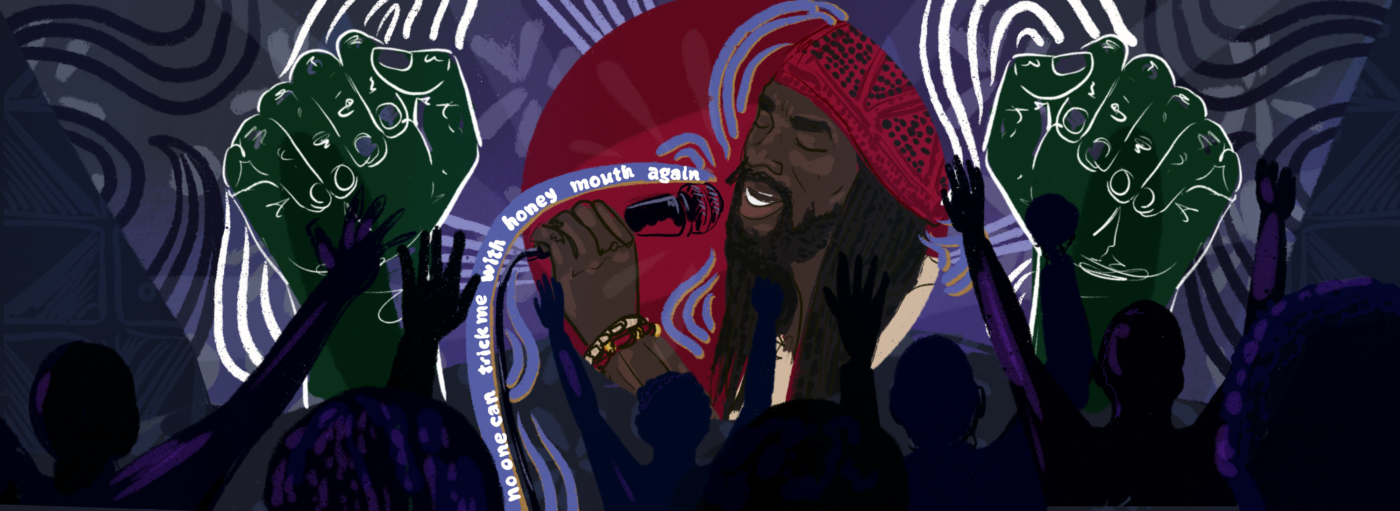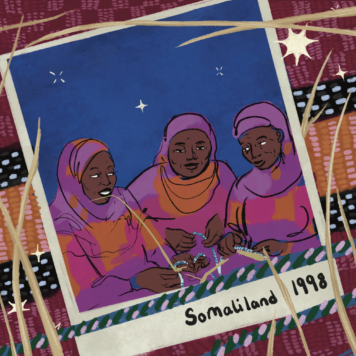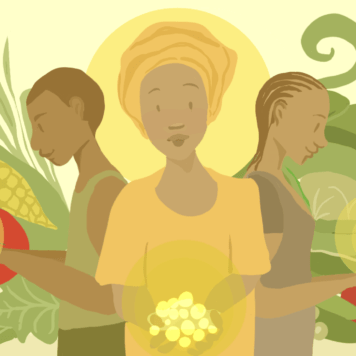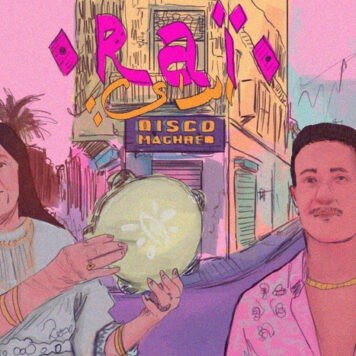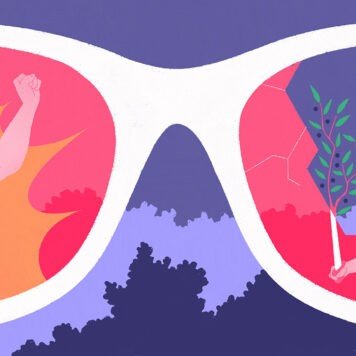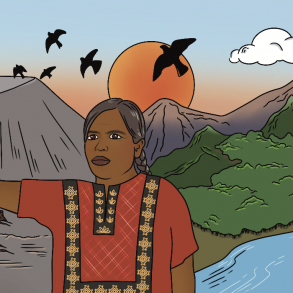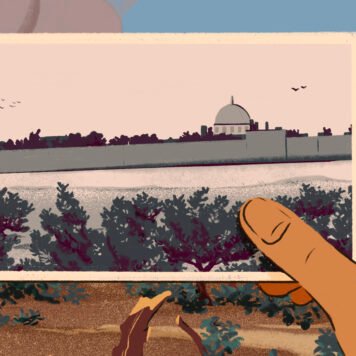“They say we’re free, and colonisation is a thing of the past
But look around you people
Time is going by, and we still can’t get it right
They say our land is the home of poverty and disease
and we’re treated like second-class citizens of the world.”
– Ohun Oju Nri, Beautiful Nubia
I first came across Beautiful Nubia and his music through the 2004 Yoruba movie, Oga (Chameleon). Nubia cameos in the film, performing his track What a Feeling. As a young Yoruba hopeless romantic, I immediately fell in love with the song.
Segun Akinlolu (aka Beautiful Nubia) is a musician and author whose music blends traditional Yoruba sounds and contemporary styles. He speaks to the rich cultural heritage of Nigeria by singing in Yoruba, Nigerian pidgin English and English, his lyrics exploring serious issues dealing with society, culture, tradition and the environment.
By using traditional rhymes, melodies and instrumentation, his music speaks to Africa’s history and its people’s struggles, reminding us of our roots and culture. It educates listeners about how to preserve decolonial traditional customs and values. Through this, Beautiful Nubia’s music becomes a powerful form of cultural memory.
Last year, I tweeted the possibility of meeting the love of my life at a Beautiful Nubia concert. Beautiful Nubia himself tweeted me back that “I just might”, and drew my attention to his EniObanke Music Festival (EMUfest) in Lagos. So, on Sunday, 20th November 2022, my dad and I put on our Sunday best and headed to EMUfest to find my new paramour.
Unfortunately, we didn’t find them (this time!), but I did leave with some gems of knowledge and a revitalised understanding of why I am such a fan of Beautiful Nubia.
Kurunmi Is On The Way
I have always appreciated the lyrics to Beautiful Nubia’s songs, but listening to ‘Kurunmi Is On The Way’ at EMUfest gave them a whole new meaning.
The track was released in 2010 on the album, Irinajo, and is about Kurumi, a Yoruba leader in the 1800s, who sent his five sons to the frontlines of a fatal battle. It uses this tale to highlight how far leaders have fallen, and to draw attention to the current cowardice and deceit of political leaders in Nigeria.
Nubia sings in the song, “real man na for action, no be for mouth o” (a real man is known through his actions, not what he says). These words speak to the nature of Nigerian leaders; they are more talk than action.
Despite the promises our leaders make, too often we have seen them shirk their responsibilities to the people of Nigeria, leaving the citizens in deplorable conditions. Their children are educated abroad whilst the people of the nation struggle in subpar educational and healthcare systems.
In one of the starting lines in the song Nubia says: “They say it is their turn now to be leaders of the people.” We all laughed when he sang this line at the concert because we collectively connected his words to the slogan for one of the current presidential candidates in the 2023 Nigerian elections: “Emi Lo Kan (It’s My Turn).”
I thought he sang it to be shady, but this is an original line from the song, suggesting Nubia predicted Nigeria’s future candidate’s slogan. Not because Nubia is psychic, but because we’ve heard this rhetoric before multiple times.
As he aptly captures in the song:
“Tell them I’ve been there many, many times before.
And no one can trick me with honey mouth again.”
Music as activism in Nigeria
The song goes on to highlight the qualities of a good leader and the qualities of our current leaders – two lists that do not align. Through this inherent political message, we can see that in addition to preserving history and culture, Beautiful Nubia’s music encourages activism.
This sits within a rich history of Nigerian music that has often been used to spread messages of socio-political resistance, create connections between communities, and celebrate human resilience.
Fela Kuti is one of the most well known artists who used his music to fight for social and political change. Through the pioneering Afrobeat sound, he highlighted issues including corruption, poverty and police brutality.
Kuti’s cousins, The Lijadu Sisters, also made crucial contributions, speaking directly to corrupt politicians in Cashing In.
Multigenre artist, Aṣa, sang about police brutality in Jailer and Fire on the Mountain in 2007, thirteen years before the #EndSARS protests against police brutality in Nigeria.
Subscribe to shado's weekly newsletter
Exclusive event news, job and creative opportunities, first access to tickets and – just in case you missed them – our picks of the week, from inside shado and out.

There are also others such as Eedris Abdul Kareem, who drew attention to the issue of lecturers demanding sex from young women in their classes in exchange for grades in his 2002 anthem, Mr Lecturer.
This type of activism not only creates a dialogue around decolonial practices but has worked to invoke action, inspiring individuals to take meaningful steps towards a more equitable future. In this sense, Nigerian music has historically served to bridge the gaps between history, culture, and activism through its transformative power.
Essentially, the sustained political message of some Nigerian music can show us how many of the issues we are experiencing in Nigeria are not particularly new. The way they manifest themselves might be different, but the problems themselves are not.
Artists like Beautiful Nubia have been using their music to raise consciousness on these issues and document them to allow an understanding of where we are coming from, where we are now, and where we could be.
The intersectionality problem in Nigerian activism
Although artists have been singing about our issues for years – practically, since the colonial conception of Nigeria; I am often left questioning at what point will the actions, philosophies and theories they sing about start to materialise in the real world? It sometimes feels like even when action is taken and Nigerians take a stand, it amounts to… nothing.
However, perhaps the key is not only to look to these songs for their overarching message, but to truly listen to their lyrics to inform the strategies in our movements. In Revolution TIme, Beautiful Nubia mentions, “seek ye first the peace of the neighbours all around you.” Yet, how many of us actually do this, and approach issues in Nigeria aware of how they affect multiple people, and not just ourselves?
Despite all we experience, many of us still have time for violence against queer people, women, and low income communities. We saw this with the purposeful and violent exclusion of queer people and their experiences of police brutality during the #EndSARS protests, and the misogyny aimed at women who participated in the protests despite their significant contributions.
The struggle in contemporary Nigeria needs to focus on the multiple ways we exist across a range of intersectional identities. Until our actions overcome the gaps and conflicts between individual struggles to imagine inventive possibilities, the emancipation we desire will remain a fantasy.
Afterall, as King Sunny Ade sang in Lift Up Nigeria, “Nigeria yi ti gbogbo wa ni” (This Nigeria is for all of us).
Nigeria’s 2023 elections
Here is the thing about my experience of a Beautiful Nubia concert: it was not just about the spectacle, the music, and the performance; it was also a site of consciousness-raising.
Many of us believe that the 2023 elections in Nigeria are monumental. For the last eight years we have experienced arguably one of the worst administrations in the country’s history. Cars are wrapping around streets in queues due to fuel scarcity, and the value of the Naira is at a record low, with the redesign causing a deadly countrywise shortage in cash.
For some, these elections are the opportunity to change all that by electing better leaders – a chance for a new Nigeria. But we have experienced the chance for a new Nigeria multiple times before. Every election comes out with the same promises, slogans and too often the same people.
This considered, it’s no surprise that it is difficult to get anyone to vote. As of the 2019 elections, the average voter turnout in Nigerian elections is now only about 30-35%, a dramatic decline from the previous 69% in 2003. Many Nigerians have simply become apathetic, and echo the sentiment: “what difference would it make?”
Nigerians are being encouraged to get their Permanent Voters Cards (PVC) and register to vote, and I encourage everyone to do this; however, I too am sceptical of the difference my vote would make.
Looking back to see ahead
How we represent our problems matters because it influences how we solve them. It is crucial to know our past in order to address our present day situations.
This includes acknowledgement of the effects of colonialism on Nigeria’s political, social and cultural scene, and learning how to begin to counteract those consequences to create the future we want. It is also about becoming aware of our prior actions and making efforts to undo their legacies.
This is where artists like Beautiful Nubia come in. He uses Indigenous ways of knowing to highlight our history and contextualise our present. Through his music, the stories and lessons of the past are remembered and re-told. In this case, for Beautiful Nubia, music serves as a living archive, preserving the memories of those lost and allowing us to better comprehend the struggle and strife of Nigeria’s past.
By connecting us with our history, his music therefore provides an essential platform to contextualise our present and future. Understanding the past helps inform our decolonising efforts and can enable us to more accurately conceptualise our present and envision our future.
As he reminds us in ‘Kurunmi Is On The Way’:
“Children, you will learn and you must never forget
The past is full of heroes from whom we can learn
And real lessons to guide us today
Many, many stories to make us proud too.”
It is important to consider what history can tell us about the choices we make now and how these will affect our future. Examining the track record of current candidates in the context of Nigerian history would be extremely beneficial for us before voting, especially considering that we elected a former military dictator from the 80s to the presidency twice in the 2010s and somehow expected positive results.
What can we learn from this to guide us? And what can we learn from our past efforts – the ones that have seemingly succeeded or failed? Who have we neglected that, had we included them in our actions, may have strengthened our cause? How can we collaborate more effectively?
The path forward to a more engaged, committed, and informed citizenry is neither simple nor easy. The challenge of voter apathy, disillusionment, and a lack of understanding of history is a tall order, and requires a concerted effort to battle.
But I truly believe it is not impossible. By engaging in dialogue, understanding our history and the contexts of our votes, and working in solidarity with each other, we as citizens can act with a renewed sense of purpose and be driven to restore both the vibrancy of our electoral process and the meaningful impact of our votes.
Artists like Beautiful Nubia facilitate this through music, and there are others using various other mediums. Through this collective effort, our democratic ideals can hopefully be more realised, and our society can be strengthened.
What you can do:
- Watch Journey of an African Colony on Youtube
- Watch Bigger Than Africa on Netflix
- Listen to the playlist of some of my favourite Beautiful Nubia songs
- Listen to a playlist of some of Nigeria’s songs with embedded activism
- Read Decolonization and Afro-feminism by Sylvia Tamale
- Read The Invention of Women by Oyeronke Oyewumi
- Read more articles by Adebayo HERE
Read other articles related to Nigerian politics:
